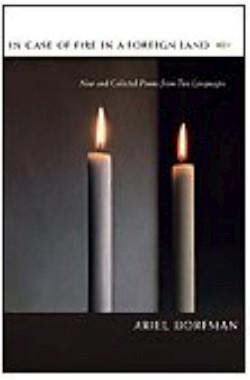In Case of Fire in a Foreign Land
New and Collected Poems from Two Languages
With the brute authenticity of a voice that has been there and done that, this Chilean poet opens his first bilingual edition of poems with a section titled “Desaparecer,” translated as “To Miss, Be Missed, Missing.” Ranging from tender disbelief to a necessarily cautious outrage, these opening poems slam down on the page from a witness who can say: “how can it be / that a father’s / joy / a mother’s / joy / is knowing / that they / that they are still / torturing / their son” / “and our greatest / hope / will be to find out / next year / that they’re still torturing him / eight months later / and he may might could / still be alive.”
The structure of these first poems is a breathless breaking of lines, as though they were uttered through a strangled search for the perfect words to illustrate the unspeakable. The translations are crisp and clear, and it is obvious that the translator has made every effort to keep the poem on the page as equivalent as possible to the original. Certain liberties might be found in vocabulary and image, particularly in some of the titles; but since these translations were done with the author, no doubt a careful consultation has resolved any discrepancies. This is easy to accept, as both the Spanish and the English titles are simply put and clearly understandable.
The book is divided into four sections. The second section, headed “Poems I Wasn’t Going To Show Anybody,” contains pieces of a rather subjective personal angst, a warming view into the deeper reflections of the poet. Like any “confessional” poems, they lack the vigor and simplicity of the “Desaparecidos” poems, which shine from the page like a stripped carcass. This departure, however, into a kind of musing sets off the starkness of the rest of the book. Part Three, “Resaca” (Undertow) are scenes remembered in exile; and Part Four (four epilogues, subtitled “Anything Else Would Have Tasted Like Ashes”) presents the hopeless phone calls of an exile trying to get news of home, and the ongoing heroic resistance, both in Chile and by members of the international community.
Dorfman, already known for a wide range of poetry, fiction, and essays in both Spanish and English, is now a professor of Literature and Latin American Studies at Duke University. In a world increasingly battered with terror and terrorist anti-terror, the American reader will discover here that a telescopic view of what is happening in far lands is more than echoed by this up close and personal report on the dehumanizing events taking place in our own hemisphere.
Reviewed by
Sandy McKinney
Disclosure: This article is not an endorsement, but a review. The publisher of this book provided free copies of the book to have their book reviewed by a professional reviewer. No fee was paid by the publisher for this review. Foreword Reviews only recommends books that we love. Foreword Magazine, Inc. is disclosing this in accordance with the Federal Trade Commission’s 16 CFR, Part 255.

